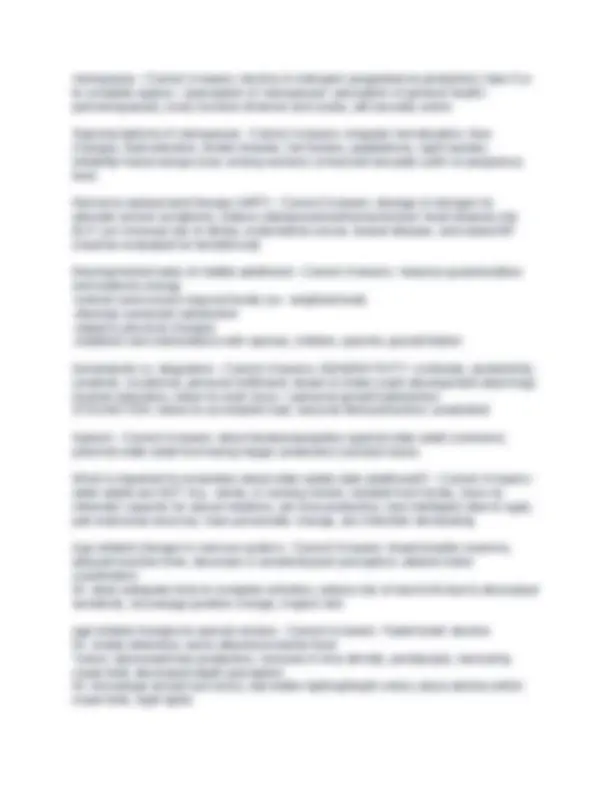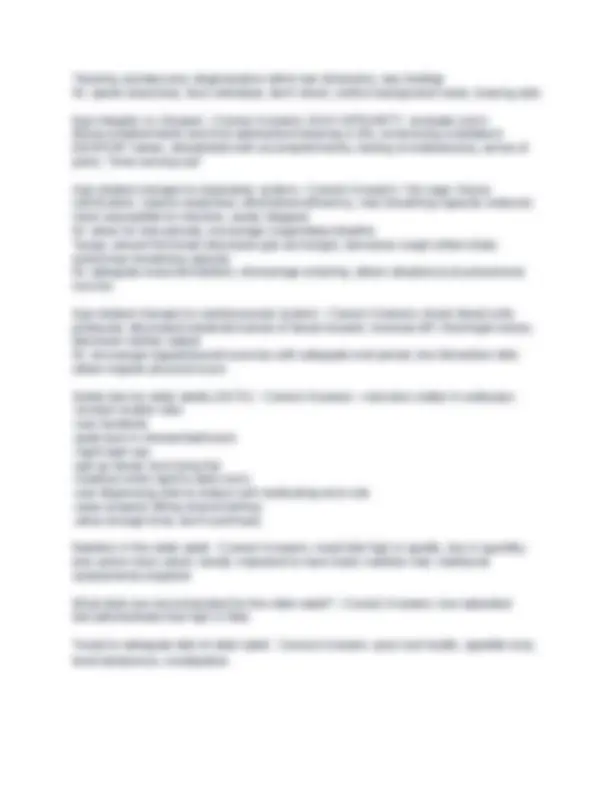




Study with the several resources on Docsity

Earn points by helping other students or get them with a premium plan


Prepare for your exams
Study with the several resources on Docsity

Earn points to download
Earn points by helping other students or get them with a premium plan
Community
Ask the community for help and clear up your study doubts
Discover the best universities in your country according to Docsity users
Free resources
Download our free guides on studying techniques, anxiety management strategies, and thesis advice from Docsity tutors
QUIZ 20 CARE OF AN ADULT UNITEK VN QUESTIONS AND ANSWERS
Typology: Exams
1 / 4

This page cannot be seen from the preview
Don't miss anything!



What are Erickson's stages of psychosocial development? (8) - Correct Answers - Infancy, toddler, preschool, school age, adolescence, young adulthood, middle adulthood, late adulthood Young adulthood - Correct Answers -(20-44 yr old) TASK: Intimacy vs. isolation; seek companionship/love with another person OR become isolated from others Middle adulthood - Correct Answers -(45-66 yr old) TASK: Generativity vs. stagnation; are productive, performing meaningful work/raising family OR become stagnant/inactive Late adulthood - Correct Answers -(65+ yr old) TASK: Ego integrity vs. despair; make sense of their life, life is meaningful/whole OR despairing because goals never reached/questions never answered Autoimmunity theory - Correct Answers -theory that the body is less able to tolerate/recognize "self"; immune system creates antibodies against itself (increased lymphocytes); reduced size/function of thymus and bone marrow (reduced immune function) can lead to infection/cancer Genetic theory - Correct Answers -idea that life expectancy is a hereditary trait; believed that several genes affect aging process (still under research) Age related change in musculoskeletal system - Correct Answers -bones more porous, tendons/ligaments less elastic, increased joint stiffness, less going motion, less going mobility/agility/endurance, thin vertebral disks NI: maintain mobility, encourage exercise (passive, active), avoid fatigue Disengagement stage of parenthood - Correct Answers -period of family life when children grown and leave home (parenting role change-need emotional/financial support) Senescence stage - Correct Answers -last life cycle stage that requires individual to cope with change; keep family contact (women outlive spouse), live independently, grandparenting
developmental tasks of early adulthood (SATA) - Correct Answers --financial/social independence -maximize self worth/identity -meaningful social relationships -assume responsibilities and independent decision making -balance personal and societal needs/expectations -accept self/others -distinguish physical attraction from love and permanent commitment -marriage, career, children Physical characteristics of early adulthood - Correct Answers -OPTIMAL function level; most body functions fully developed, muscular strength/energy/ endurance are at peak; senses are the sharpest (visual=20 yr but declines 40) When is height established? - Correct Answers -FEMALE: 16-17 yr MALE: 18-20 yr STABLE: between 30 and 45 but declines later due to disk settle Intimacy vs Isolation - Correct Answers -INTIMACY: develop deepest hopes/concerns in connection with another person; accept closeness; "virtue of love;" share lives; resolve demand of intimacy, distance, or competition MARK OF ADULT ISOLATION: distance from intimate relationships, failure in task; leads to isolation and self-absorption Rest and sleep of early adulthood - Correct Answers -function well with 7-9 hr; no scheduled daytime rest but maintain adequate rest during day to increase productivity; ESSENTIAL for pregnant women for health of her/baby What is the leading cause of disability/death of early adults? - Correct Answers - ACCIDENTS- work, vehicle, sports; violence Physical characteristics of middle adulthood - Correct Answers -bone mass decrease, slight height change (compress of spinal vertebrae), decrease in muscle fiber/mass, redistribution of body shape/contour; decrease in basal metabolism; basic neurologic function=high level still, vision/hearing/skin change When is calcium lost? - Correct Answers -FEMALE: after menopause MALE: more gradual rate, lower risk for osteoporosis presbyopia - Correct Answers -vision defect in advancing age that involves accommodation/ recession loss of near point caused by loss of crystalline lens elasticity) presbycusis - Correct Answers -normal/progressive age related hearing loss, auditory threshold/pitch loss
hearing: presbycusis, degeneration within ear structures, wax buildup NI: speak slow/clear, face individual, don't shout, control background noise, hearing aids Ego Integrity vs. Despair - Correct Answers -EGO INTEGRITY: evaluate one's life/accomplishments and find satisfaction/meaning in life; reminiscing (validation) DESPAIR: failure, dissatisfied with accomplishments, feeling of restlessness, sense of panic, "time running out" Age related changes to respiratory system - Correct Answers -rib cage: thorax calcification, muscle weakness, diminished efficiency, max breathing capacity reduced, more susceptible to infection, easily fatigued NI: allow for rest periods, encourage cough/deep breathe *lungs: alveoli thin/small (decrease gas exchange), decrease cough reflex/ciliary action/max breathing capacity NI: adequate exercise/nutrition, discourage smoking, obtain streptococcal pneumonia vaccine Age related changes to cardiovascular system - Correct Answers -fewer blood cells produced, decreased elasticity/narrow of blood vessels; increase BP, thick/rigid valves, decrease cardiac output NI: encourage regular/paced exercise with adequate rest period, low fat/sodium diet, obtain regular physical exam Safety tips for older adults (SATA) - Correct Answers --minimize clutter in walkways -remove scatter rubs -use handrails -grab bars in shower/bathroom -night light use -get up slowly from lying flat -cautious when light to dark room -use dispensing aids to reduce self medicating error risk -wear properly fitting shoes/clothing -allow enough time; don't rush/hurry Nutrition in the older adult - Correct Answers -need diet high in quality, low in quantity; less active=less caloric needs; important to have basic nutrition met, nutritional assessments required What diets are recommended for the older adult? - Correct Answers -low saturated fat/carbohydrates but high in fiber Treats to adequate diet of older adult - Correct Answers -poor oral health, appetite loss, food intolerance, constipation